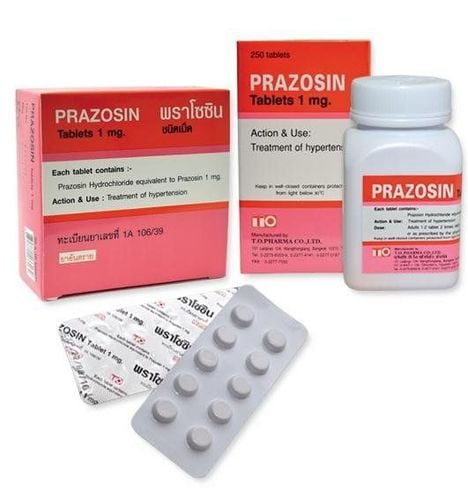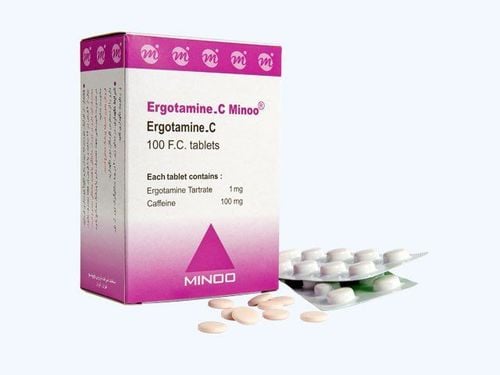This is an automatically translated article.
What is Timmak? Timmak with the main ingredient is dihydroergotamine mesylate 3mg. The drug is commonly used to treat orthostatic circulatory disorders, lower blood pressure, dizziness, prolonged fatigue... Below is specific information about its uses, as well as how to use and dosage. suitable medicine that people need to know before being prescribed medicine.
1. Uses of the drug Timmak
Dihydroergotamine is a hydrogenated ergotamine (ergot alkaloid) with complex pharmacological effects.
The drug has affinity for both alpha - adrenergic receptors and serotoninergic receptors, so it has both stimulant and inhibitory effects. In orthostatic hypotension, dihydroergotamine has a selective effect on constricting the reservoir vessels (veins and venules) with almost no effect on the resistance vessels (arteries and arterioles). Due to increased venous tone, it leads to red stools, thus preventing excessive accumulation of blood in the veins.
In migraine, the drug initially compensates for the lack of serotonin in the plasma. Then, due to the stimulating effect of serotonin, it will counteract the loss of tone of the extracranial vascular system, the carotid system has been dilated.
For quick-acting migraine, an injection of dihydroergotamine is recommended. As for the prevention of migraine, it is recommended to take long-term oral tablets to stabilize the tone of the extracranial vascular system.
Timmak is indicated for the treatment of one of the following cases:
Orthostatic circulatory disorders. Hypotension. Symptoms of dizziness, prolonged fatigue. Intermittent treatment to prevent migraine and vasomotor headaches. Timmak is contraindicated in the following cases:
People with hypersensitivity to dihydroergotamine or any of the excipients included in the drug's formula. Do not apply the medicine to scratched skin, mucous membranes and breast area while breastfeeding. After taking the medicine, if the pain persists for 7-10 days or the bruising persists, consult a doctor. Do not give this medicine to a child under 3 years old, or a child with a history of epilepsy or having a febrile convulsion. Children under 10 years old need to consult a doctor and follow the doctor's prescription.
2. Usage, dosage
Timmak medicine is only used when prescribed by a qualified doctor, so patients need to take the medicine properly and in the right dose as prescribed, consult and guide the doctor or pharmacist, medical professional. economic.
2.1. How to use The drug is taken orally directly before a meal, swallowing the softgels whole with boiled or purified water.
Note that the drug should not be taken with alcohol, beer and alcoholic beverages, as well as carbonated drinks, bottled soft drinks will affect the drug's effect.
2.2. Dosage Usual dose: take 1 tablet (3mg) x 3 times/day.
Note: The specific dose of the drug will depend on the medical condition, the progression of the disease and the condition of each patient, which the doctor will prescribe the appropriate dose. Therefore, patients should strictly adhere to the dosage prescribed by the doctor to bring the best treatment effect.
3. Side effects
When using Timmak, patients may experience undesirable effects (ADRs) such as:
Common side effects: headache, nausea, vomiting, pain, leg cramps Side effects Uncommon: dizziness, profuse sweating, anxiety, diarrhea, rash, flushing, dyspnea, vasoconstriction, hypertension Rare side effects: cerebrovascular accident, myocardial infarction. If you see these side effects when taking the drug or have other unusual signs, you should notify your doctor or medical professional for instructions on how to handle it in time. In case of danger and emergency, take the patient to a nearby medical facility for emergency treatment and timely treatment.
4. Drug interactions
Timmak can interact with a number of other drugs and this interaction can be antagonistic or synergistic, but both affect the effectiveness of the drugs being taken.
Some drugs that can interact with the active ingredient dihydroergotamine in Timmak include:
Concomitant use of dihydroergotamine with vasopressors, sympathomimetic drugs will increase blood pressure excessively. Taking dihydroergotamine with beta-blockers can cause vasoconstriction and decreased blood flow. Concomitant use with nicotine may cause vasoconstriction in some patients and increase the risk of ischemic ergotism. Used in combination with macrolide antibiotics (erythromycin, josamycin, ponsinomycin, triacetyloleandomycin), ergot toxicity increases rapidly. Dihydroergotamine counteracts the vasodilator effect of glyceryltrinitrate (nitroglycerin) when administered concomitantly. Erectile dysfunction with methysergid increases the risk of vasospasm in some patients when taken together. To avoid drug interactions, you should inform your doctor of the list of drugs you are taking, including medicines to treat diseases, herbs or functional foods, so that the doctor can advise and adjust, change the dosage. suitable drug.
5. Attention and caution
In order to ensure the safe and effective use of Timmak, patients also need to pay attention and be careful with some of the following issues
The drug is only used when prescribed by a doctor, so it is necessary to use it. medicines according to the prescription and instructions of the doctor. Absolutely do not arbitrarily calculate and adjust the dose of the drug without consulting the doctor. Administration of the drug can cause a vasospasm reaction and if the vasoconstriction is prolonged it can cause necrosis or death. Therefore, if signs and symptoms of vasoconstriction are observed, the drug should be discontinued. Drugs should only be used for vasomotor migraines because they have no effect on other types of headaches and they have no analgesic properties. Pregnant and lactating women should not use the drug because the drug can affect the fetus or young child.
6. Handling missed dose, overdose
Missed dose: If you forget to take a dose, take it as soon as you remember. However, if it is almost time for your next dose, skip the missed dose and continue with the next scheduled dose. Do not take 2 doses together to make up for the missed dose to avoid overdose.
Overdosage: Currently there are no reports of overdose when taking Timmak, however, overdose may have signs of ergot toxicity: loss of sensation, pain and cyanosis of the extremities, loss of pulse or pulse weak pulse, difficulty breathing, increased or decreased blood pressure, delirium, confusion, convulsions, nausea, vomiting, abdominal pain.
When there are signs of suspected overdose, it is necessary to stop the drug and call the doctor or take the patient to the nearest medical center for advice and emergency measures and timely treatment.
7. How to store medicine
Store the medicine in a dry place, avoid moisture, avoid sunlight and have a temperature below 30 degrees Celsius. It is necessary to keep the medicine out of the reach of small children and domestic animals. Collect and dispose of unused medication according to your doctor's advice, manufacturer, or local waste company's instructions for safe disposal. Absolutely do not flush the medicine under the tap and do not throw it in the toilet. The above is all information about the drug Timmak and this information is for reference only and is not intended to diagnose or treat the disease. Therefore, before using the drug, users need to consult a doctor for advice, as well as the best indication.
Please dial HOTLINE for more information or register for an appointment HERE. Download MyVinmec app to make appointments faster and to manage your bookings easily.













